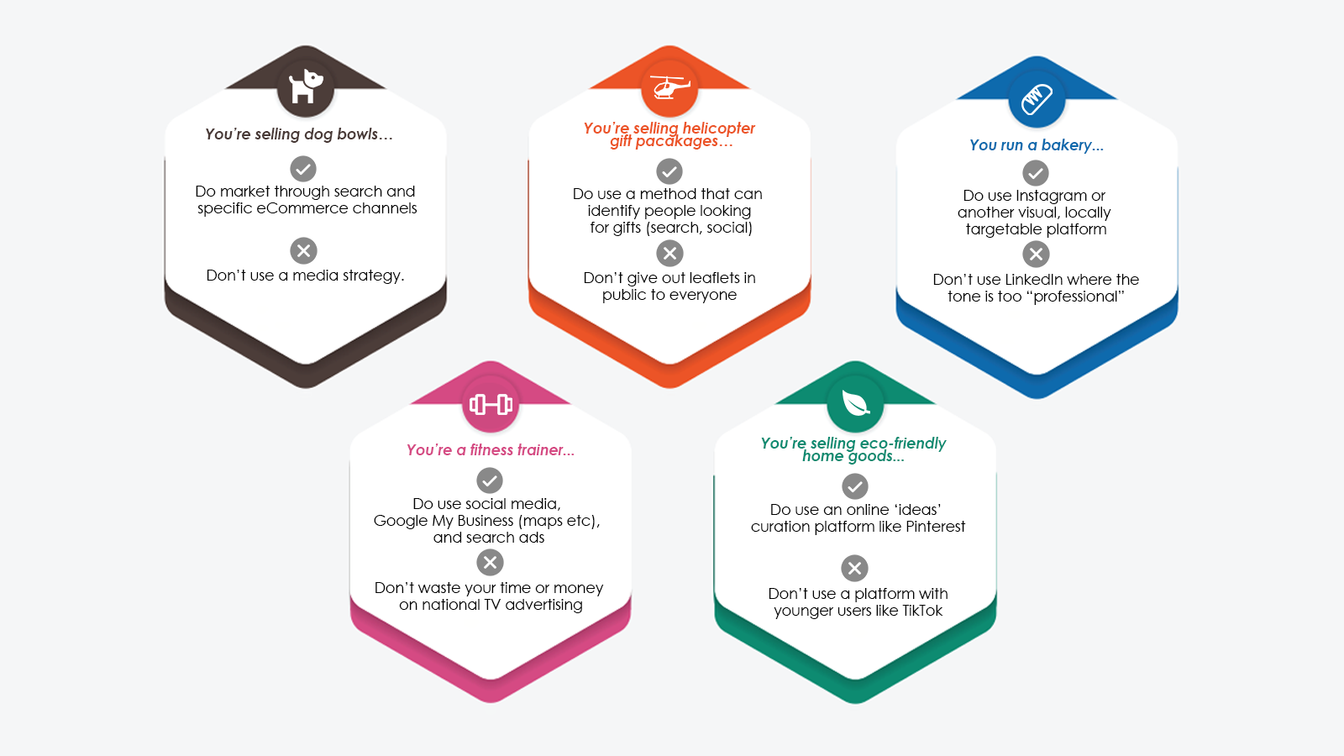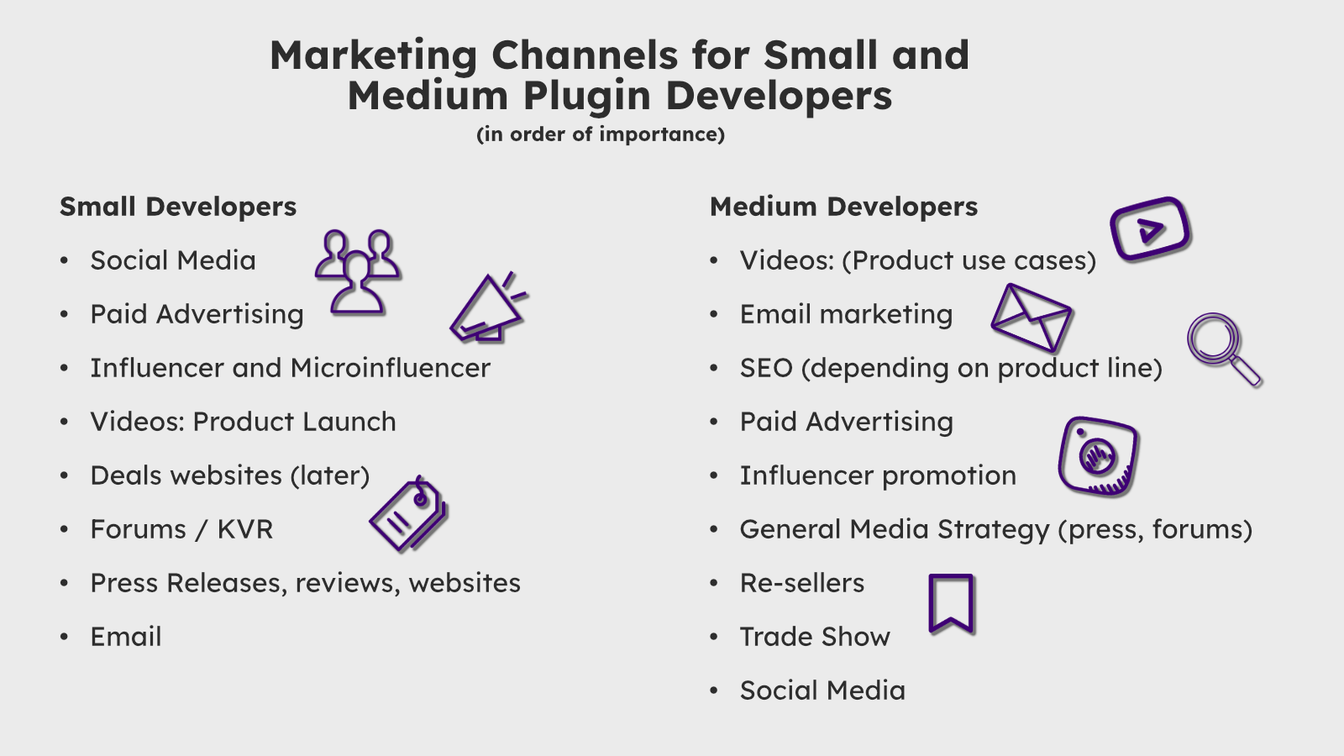Monday, September 22, 2025
How Does a Small Plugin Developer Grow Bigger?

James Russell
Music Software Marketing Consultant
James is a business and marketing consultant for music software companies. He's always on the lookout for new startups with the next big thing.
https://www.eggaudio.com/One of the best things about our industry is that a very small team – or even just a single person – has the ability to create an instrument or effect and bring it to market. But as a business grows and charts its own path, there are fewer and fewer relevant examples to look to for direction. Everyone’s experiences diverge, and what works for one business may not work for another.
I am a marketing and business consultant who works only with plugin companies. In this article, I’ll distill knowledge from working with audio software developers of all sizes – from pre-launch startups to the biggest in the business – with the aim of providing a path from small to medium, in terms of marketing.
Of course, not every company is the same, and neither is every plugin. Throughout, I’ll make assumptions and address the ‘average’ developer. This is an intentionally one-size-fits-all perspective.
The main difference in marketing operations between a small- and a medium-sized plugin brand
There are many differences in marketing strategy between a small and a medium plugin developer. If we want to perceive a single point of difference, instead of many tiny ones, we have to zoom out. Once you look at the business as a whole, you start to see that what changes while growing is the channels used.
As a business grows, the things that were once vital can start making less of an impact. For example, creating content on social media that leads to 10 sales is a big achievement in the first few weeks – but the appeal of doing this changes when your mailing list breaches about 10,000 contacts. At this point, it might be time to put in less effort driving sales week-to-week on Instagram, and to instead design longer-form videos and articles to cater to an interested newsletter.
In this case, you wouldn’t suddenly abandon all social media accounts, Radiohead-style, but that channel would be used in a different way, integrated differently into a new overall strategy.
With growth, you get access to new methods you didn’t have previously, and old methods can feel less efficient by comparison. Your priorities should change accordingly.
A million things you could do
One of the things I find myself saying all the time: “There are a million things you could do”. For any given business, a million valid marketing ideas might cross your mind. Everything from billboards to bespoke bathrobes could work, but not everything is as relevant and as effective for your specific business. It’s not exactly hard to get marketing ideas from the internet.
With the sheer number of ideas that you could try, the key isn’t to think of more ideas; the key is to zero in on the idea that aligns best with your industry and your place in the market.
Imagine you run a restaurant. A YouTube channel is probably not the right place for a restaurant to invest time and money into marketing. Why? A restaurant is limited by its geographical location, but YouTube is accessible worldwide. Rather than waste money and effort reaching more potential customers who will never arrive in their area, a restaurant owner would probably do better focusing on Google Maps and social media, given their innate way of narrowing down the audience to only people who are in the same location.
A plugin developer should consider the opposite: a localized billboard campaign is an obviously bad marketing channel for selling plugins. YouTube is almost perfect, being able to reach anyone interested in music production throughout the entire world.
Here are some more examples of how the right and wrong marketing channels may differ with differing businesses.

With this list, I’m risking stating the obvious, but with the number of similar mistakes I see from all sorts of businesses (big and small), including plugin companies, it does bear bringing this home.
Also note that, as you go further down the list, you start to see correct and incorrect choices within the same channel, between different platforms within it. Almost no company tries to sell through every possible social media platform. It would take too much time and money to build communities of followers on Instagram, X, Facebook, Bluesky, Vk, Reddit, TikTok, LinkedIn and every other platform.
Marketing channels: from small to medium developers
Now that I’ve explained marketing channels and the differences between them, let’s return to the main thrust of this article: that as you grow as a plugin developer, what changes is the mixture of channels you use to market yourself.

For a more detailed list of all channels and how they work, check out next article!
Remember, these lists are simplified, and will actually vary depending on the exact company and its specific products – for example, a developer creating effects for mastering engineers would rely more heavily on testimonials than a synth developer, who would in turn rely more on video content.
How the channels change
As a company’s sales and/or product line get bigger, smaller tactics like social media and press releases are still useful, but they become less important individually, and less decisive to the volume of sales, and can be considered as one larger activity.
Educating an audience through video, fostering a user community, and providing valuable articles and information through email are bigger, more structural actions, rather than immediate calls to buy something. Put simply, marketing becomes a longer-term game. I’ll talk more about branding in the next article.
How to grow larger as a small plugin developer
Here’s where I get to the real nugget of information, but I think the preamble was all worth it to introduce the solution.
Assuming that you have finite resources, your first port of call should be to evaluate the marketing channels for small and medium developers as listed above.
First, align your strategy with the marketing channels for small developers. In other words, if you’re a small plugin developer, consider not buying that booth at NAMM; consider not writing another blog article. Leave those efforts for a couple of years later, and focus only on the channels that are aligned with building a small developer – those that are more efficient uses of your time and effort at this stage and size.
The hard part is to deprioritize and ‘abandon’ the channels that used to work successfully, in favor of the channels that are starting to take off more. One pitfall would be to only add effort or money into newly effective channels, without taking any away from the channels that are serving you less well.
Using Moonbase, you can easily track sales and revenue by their attributed marketing campaigns to help you make these decisions, and if using other platforms you should look into analytics tooling to get the same.
Next, as sales grow, you have a roadmap for transitioning into larger marketing channels, and putting more or less importance on the different ones as time goes by.
Next article: Growing larger, and more knowledge for smaller developers
In the next article, I’ll explain how medium-sized developers can grow larger and become household names, even though the marketing strategies and behaviors become vaguer and less obviously measurable. I’ll also start explaining every marketing channel in more detail, so even if you’re not a medium developer looking to rise to another level, there’ll be something for you there as well.
What I left out
There are many things I haven’t said in this single article. I’ve kept things simple and made a lot of assumptions in order to be able to say anything at all.
Your pricing and your product strategy are also key to growth. A plugin developer can grow without launching new products frequently, but the business model usually has to be set up for this to be a viable way to function. For most developers, having a certain frequency of releasing products is a marketing mechanism in itself.
Then, of course, the ‘break all the rules’ tip: certain things, like using a billboard to advertise a plugin, are never done, but it's not to say they couldn’t be. Successful campaigns tend to come from leftfield or break the established rules. Doing something ill-advised can sometimes be clever – but only if it’s all done right.
Start selling through Moonbase
Sign up today to get started selling your software through Moonbase.
